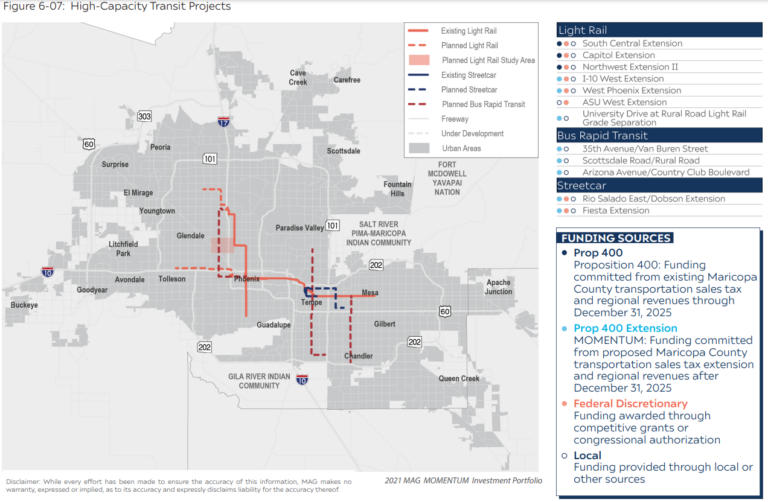Negotiations are ongoing between Governor Katie Hobbs and Republican Arizona legislators in an attempt to send a renewal of the Proposition 400 half-cent transportation sales tax to Maricopa County voters.
Despite unanimous support from all 32 agencies in the Maricopa Association of Governments, former Gov. Doug Ducey vetoed legislation last year that would have put the renewal on the ballot, saying it amounted to a tax increase and did not provide sufficient focus on road projects, among other objections. Various attempts to both crush the tax as it currently operates and to renew it largely have both languished ever since.
Some legislators and conservative lobbying groups like the Arizona Free Enterprise Club oppose the MAG regional transportation plan and Prop 400 funding because of what they claim is an over-emphasis on public transit and air quality versus freeway and street development.
Under Arizona law, the legislature and governor must approve putting a local transportation sales tax for Maricopa County on the ballot. No other county has similar restrictions.
Prop 400’s current and previous iterations have funded major freeway development, the regional bus system and light rail for Maricopa County, home to two-thirds of Arizona residents. The current tax is set to expire at the end of 2025, and its uncertain future has already begun to impact projects with timelines that stretch beyond the cutoff date.
If the tax is not renewed, Maricopa County will have to compete directly with other counties and municipalities for federal transportation project funding, which will cause upheaval for projects all around the state, according to MAG officials.
Senate President Warren Petersen has called MAG “unaccountable,” a charge Avondale Mayor and MAG Chair Kenn Weise calls, “A bunch of crap.”
The current MAG proposal uses 40.3% of its funding for mass transit, which primarily focuses on bus service. 4% would be spent to maintain the light rail. No money would be used to expand the light rail, which would have to rely on a combination of funding from individual cities and federal mass transit monies.
Freeways would see 40% of MAG’s spending, with the remainder going to major roads and regional programs like air quality.
There are presently two competing bills in the Legislature and a third waiting in the wings.
The first is a 20-year plan supported by the Free Enterprise Club that would raise freeway spending to 52%, spend 22% on major road projects and cut transit spending to 26%.
A 20-year plan from Rep. David Livingston of Peoria proposes 40% for freeways, 21% for roads and regional projects and 39% for transit. The proposal also includes several unrelated items that have not drawn support elsewhere, including zoning changes to increase housing development and prohibiting bans on small homeless shelters run by nonprofits and religious organizations.
Sen. Petersen has a third plan that has not yet been formally introduced. His 25-year proposal would dedicate 47.5% to freeways, 19% to local roads and regional projects and 33.5% to transit.
Hobbs has not provided details on the negotiations but has said she wants to see something come to her desk for a signature. She has admonished the Legislature to “stop playing games” and has accused opponents of holding the region’s economy hostage because of their dislike of public transit.
Both Hobbs and Weise have publicly reminded legislators they are not voting for the sale tax, they are voting to put the sales tax on the ballot for public consideration. “They’re voting to send this to the people,” Weise said. “Just pass the bill, give it to the governor and … if it’s a horrible plan, the people don’t vote for it.”
If the tax is renewed in 2025 at the end of its current term, MAG projects it will raise $20B in 2020 dollars over its lifespan. (Source)

